| Srl | Item |
| 1 |
ID:
131988
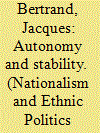

|
|
|
|
|
| Publication |
2014.
|
| Summary/Abstract |
Autonomy is often seen as an institutional instrument to manage substate nationalist conflict. Its implementation is key in determining its impact on conflict. While the central state might be satisfied with the absence of violence and stability as a measure of success, an aggrieved group will view success as gaining new powers and new resources. Autonomy often unravels when different goals are being pursued during implementation. "Special autonomy" in Papua failed because, first, the law was not the product of negotiation but of a solution that the central government imposed; second, Papuans remained divided on its utility and, ultimately, failed to seize the opportunity provided; third, the central government undermined the law in its attempts to curb secessionism, ultimately failing to make it credible.
|
|
|
|
|
|
|
|
|
|
|
|
|
|
|
|
| 2 |
ID:
153719
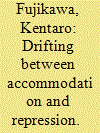

|
|
|
|
|
| Summary/Abstract |
A central government facing separatist activities adopts various policies to respond to them. In some cases, the government represses them harshly, while in other cases, it tries to accommodate the separatists’ demands. We currently have two strands in the literature to understand which policies are implemented by the government: the reputation theory and the cost-benefit calculation model. However, neither of them is sufficient to explain Indonesia's policies toward its separatists in Aceh and Papua following democratization. Indonesia's policies toward separatists have been drifting between accommodation and repression. To understand these policy shifts, this paper emphasizes the importance of the inner workings of the central government, introducing two variables: the preferences of national leaders and the existence of veto players. This paper demonstrates that these perspectives are essential in order to fully explain the Indonesian government's policies toward its separatists.
|
|
|
|
|
|
|
|
|
|
|
|
|
|
|
|
| 3 |
ID:
006086
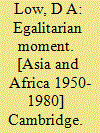

|
|
|
|
|
| Publication |
Cambridge, Cambridge University Press, 1996.
|
| Description |
xiv, 131p.Hbk
|
| Standard Number |
0521496659
|
|
|
|
|
|
|
|
|
|
|
|
Copies: C:1/I:0,R:0,Q:0
Circulation
| Accession# | Call# | Current Location | Status | Policy | Location |
| 037719 | 930/LOW 037719 | Main | On Shelf | General | |
|
|
|
|
| 4 |
ID:
084036
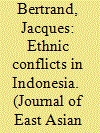

|
|
|
|
|
| Publication |
2008.
|
| Summary/Abstract |
Beginning in the mid-1990s, there was a sudden rise in violent ethnic conflict in Indonesia. Two aspects that require explanation are the timing and clustering of this type of conflict historically. Other studies have not adequately explained these aspects. Methodological and thematic choices have generated problems with identifying and explaining clustering. Microlevel studies fail to account for the broader changes occurring at a macrolevel. Some researchers have chosen to broaden the scope of analysis of violent events to provide explanations of violence more generally. After reviewing these other studies, I argue that a historical institutionalist approach remains best able to explain the clustering of conflicts and the following period of stability. Changing institutional contexts at critical junctures created rising anxieties as well as opportunities to renegotiate group inclusion and status in the Indonesian state.
|
|
|
|
|
|
|
|
|
|
|
|
|
|
|
|
| 5 |
ID:
137977
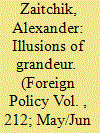

|
|
|
|
|
| Summary/Abstract |
On the WPLO page, Anari posted unclassified diplomatic cables related to West Papua’s colonial past, updates from exiled independence activists, and videos of defiant rebel leaders training for armed struggle in remote highland camps. He also shared gruesome photos of West Papuans who reportedly had been beaten, shot, or tortured by the Indonesian security forces that have controlled the western half of New Guinea, the world’s largest tropical island, since 1962. Because foreign journalists and NGOs are rarely granted entry to West Papua and are closely monitored when they are, the page opened a rare, real-time window into one of the bloodiest and best-kept secrets of the South Pacific.
|
|
|
|
|
|
|
|
|
|
|
|
|
|
|
|
| 6 |
ID:
089669
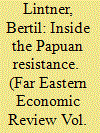

|
|
|
|
|
| Publication |
2009.
|
| Summary/Abstract |
The Indonesian election on July 8 seems likely to give Susilo Bambang Yudhoyono another five years in office. He is ahead of other candidates in opinion polls, and his Democratic Party emerged as the country's largest in the parliamentary elections in April. A high degree of normality and stability has returned to Indonesia after years of political and social turmoil. Only a decade ago, many feared that Indonesia would break up along ethnic lines and become a "Southeast Asian Yugoslavia.
|
|
|
|
|
|
|
|
|
|
|
|
|
|
|
|
| 7 |
ID:
141739
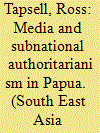

|
|
|
|
|
| Summary/Abstract |
This article examines the hindrances to journalists' autonomy in the Papua provinces of Indonesia. It argues that media practitioners in Papua are operating in a subnational authoritarian environment, where the freedoms enjoyed by journalists elsewhere in Indonesia's largely robust media are not afforded to local journalists. The article explains that security forces and local government are the main factors influencing mainstream news content in the region. Yet, as Internet penetration rises and new communication technologies are advanced, new online journalism ventures are gaining in prominence. Their success will depend on whether subnational authoritarianism remains the status quo in a region where new local media ventures are largely unable to provide open and critical coverage of events and issues.
|
|
|
|
|
|
|
|
|
|
|
|
|
|
|
|
| 8 |
ID:
071155
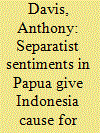

|
|
|
| 9 |
ID:
131214
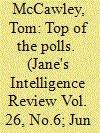

|
|
|
| 10 |
ID:
152503
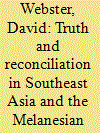

|
|
|
|
|
| Summary/Abstract |
Recent experiences with truth and reconciliation processes in Southeast Asia and the Southwest Pacific suggest that there is a role for historical research and memory in helping to build sustainable peace and stability in new nations—and conversely, that ignoring violent pasts undermines peacebuilding efforts. Two truth commissions have operated in this region, in Timor-Leste (East Timor) and Solomon Islands. There are also calls for truth and reconciliation processes in Indonesia at the national and local levels, including in (West) Papua. As the only Western developed country to have held a full truth commission, Canada could play a powerful role in promoting and supporting mutual dialogue on the implementation of truth and reconciliation outside its borders. We can derive both potential lessons and recommendations for Canadian action to promote truth and reconciliation processes from the cases of Indonesia, Solomon Islands, and Timor-Leste.
|
|
|
|
|
|
|
|
|
|
|
|
|
|
|
|
| 11 |
ID:
098235
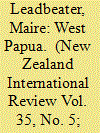

|
|
|